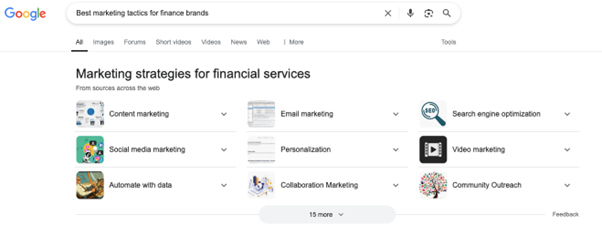Search engine optimisation (SEO) has been rocked over the last 12 months. Top performing content websites like Hubspot saw an 80% drop in traffic with many experts providing suggestions as to why. One of the most commonly sited reasons is the rise of Google’s Search Generative Experience. SGE leverages generative AI to provide concise answers directly on the search results page, reducing the need for users to click through multiple links. In this article, we’re looking at how to optimise your content for AI enabled search.
Latest research by SE Rankings show that:
- 64% of the analysed keywords either have an SGE answer or a Generate button.
- The average text length of the SGE snippet is approximately 3,485 characters.
- The most common number of links in the SGE answer after expanding is 8 links.
- 85.5% of SGE snippets link to one or more domains from the top 10 organic results.
- quora.com, local.google.com (Google Maps), and en.wikipedia.org are the most linked domains in SGE.
- SGE snippets containing text appear in SERPs alongside featured snippets approximately 25% of the time.
- Long-tail keywords are more likely to trigger AI-powered responses.
If bringing quality traffic to your site is part of your marketing strategy, then your content needs visibility in AI-driven search results. Contentworks Agency works with global finance brands to create effective content marketing strategies and craft optimised content.
To better understand Googles SGE read our article here. If you’re ready to get on with creating AI-enabled search and looking for top tips, then read on.
What is Google’s Search Generative Experience?
Google’s SGE utilises advanced AI models to generate comprehensive overviews in response to user queries. Unlike traditional search results that list individual web pages, SGE provides synthesized information directly on the search page. This approach aims to enhance user experience by delivering quick and relevant answers.

A study analysing 1,000 commercial terms found that Google displayed a Search Generative element for 86.8% of all search queries, indicating the extensive reach of SGE. It’s not just Google using AI, Bing is also on the bandwagon. Their aim is to provide users with tailored answers that are more closely aligned to users intent.
Tips to Optimise Content for AI-Enabled Search
Good, white hat, SEO is still relevant. Your content needs to build trust with search engines and that take time. You need to demonstrate authority and focus on user experience rather than keyword stuffing. Here are some of our tips to enhance your content’s visibility within AI-driven search results:
#1 Experience, Expertise, Authoritativeness, and Trustworthiness (E-E-A-T)
Google prioritises content that demonstrates high levels of experience, expertise, authoritativeness, and trustworthiness. Your content should:
- Showcase Expertise: Highlight the credentials and experience of content creators.
- Cite Authoritative Sources: Reference reputable sources to substantiate claims.
- Create fresh content: Have a publishing schedule for your blog with informative content your users are interested in.
Content that aligns with E-E-A-T principles is more likely to be featured in AI-generated summaries. Your content should also go beyond keywords but also look at entities. Not a new thing, SEO describes ‘entities’ as a person, place, thing, idea or concept. These entities are found on sites like Wikipedia or Google’s Knowledge Graph. SGE has placed even more importance on entities as they provide contextual meaning that search engines leverage to deliver relevant search results.
#2 Optimise for Conversational Queries
SGE is designed to handle natural language queries effectively. Here’s how to optimise for this:
- Use Natural Language: Write content that mirrors how users naturally ask questions.
- Incorporate Long-Tail Keywords: Focus on specific phrases that reflect conversational search terms.
#3 Embrace Visual Content
Visual elements often secure prominent positions in SGE results. Optimising visual content can improve engagement and visibility in AI-driven search results.
- Utilise High-Quality Images and Videos: Create original visual content that complements textual information. Make sure they are optimised for web and mobile.
- Search intent: Ensure your images and videos align with user intent.
- Keywords: Include researched keywords in your titles, captions, descriptions and alt tags.
- Implement Structured Data: Use schema markup to help search engines understand and display visual content appropriately.
#4 Comprehensive and Concise Content
AI models favour content that provides thorough yet succinct information. Well-structured content is more likely to be utilised in AI-generated summaries. To achieve this:
- Address User Intent Fully: Ensure content answers potential questions comprehensively.
- Use Clear Formatting: Employ headings, bullet points, and summaries for easy readability.
#5 Use Structured Data Markup
Structured data helps search engines interpret content contextually. Here’s what you need to do:
- Apply Schema Markup: Use relevant schemas to categorise content accurately.
- Maintain Consistency: Ensure structured data aligns with on-page content.
- Proper use of structured data: This can enhance content visibility in AI search features.
#6 Monitor and Adapt to AI Search Trends
The AI search landscape is continually evolving. Your SEO strategy is not a one-time effort but a continuous activity that your content marketing department should be on top of. Continuous adaptation of your strategy is crucial for maintaining and improving search visibility.
- Stay Informed: Regularly follow updates from authoritative SEO sources.
- Analyse Performance Metrics: Use analytics tools to assess content performance in AI search results.
- Be Flexible: Be prepared to adjust strategies based on emerging trends and algorithm updates.
The Impact of SGE on User Engagement
The introduction of SGE has significantly influenced user behaviour. According to Adobe research, AI search referrals for US retail sites surged by 1,300% during the 2024 holiday season. Users referred by AI search engaged more with websites, spending 8% more time, browsing 12% more pages, and exhibiting a 23% decrease in bounce rates compared to traditional search referrals.
These statistics underscore the importance of optimising content for AI-enabled search to enhance user engagement and retention. SGE will continue to change and transform the search landscape. Content marketers need to embrace the changes and learn how to optimise for AI-enabled search.
Speak to Contentworks Agency for content that places you in front of your target audience.
